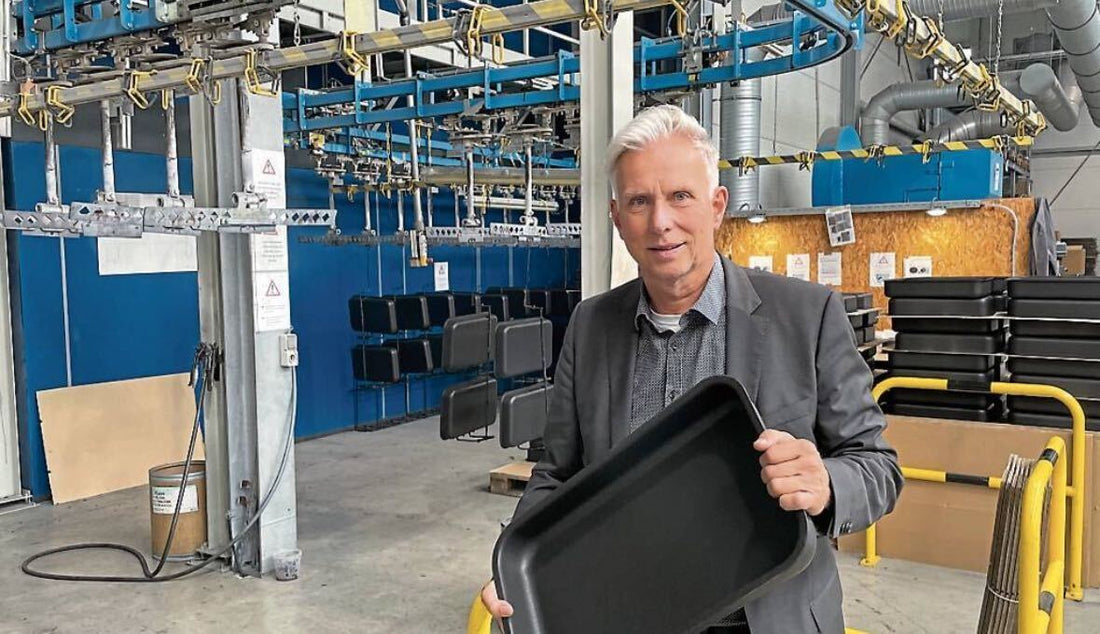
Winner of the Innovation Award 2023
From frying pan to semiconductor:
INNOVATION AWARD - Dr. Christoph Stecher has given the big players in the coating industry a run for their money.
"Three-Michelin-starred chef Juan Amador is a big advocate for them – for the pans and pots from Wilhelmshaven. The man has the highest standards and makes no compromises. He has already earned numerous Michelin stars. The Wilhelmshaven cookware manufacturer acs-Coating Systems GmbH basks in his reflected glory. Other companies can press pans, too. What makes them special is the coating – a proprietary development of acs Coating Systems, or more precisely, of Dr. Christoph Stecher (60), a physicist with a doctorate. "With this coating, we are ten to twenty years ahead of the competition," says Stecher. Besides its mechanical strength, the coating is characterized by its heat resistance, non-stick properties, and, above all, the fact that it contains no Teflon or similar chemical compounds (PFAS) suspected of posing health risks. It is ceramic-based."
Father Friedhelm founded an engineering office in 1987.
Acs now boasts a portfolio of new coatings for a wide range of applications, from fuel cells to wind energy, which, as Stecher assures, are superior to the previously used "Teflon coatings" and render "Teflon" obsolete. Four new patents were recently filed for these coatings, with more in the pipeline. This convinced the jury of the first Wilhelmshaven Innovation Prize to award the company the prize in the established companies category. Acs Coating Systems would not exist without the former Olympia Works. They provided Stecher's father, Friedhelm, with crucial initial support in the early 1990s. The engineer had previously been head of development for a major automotive supplier. The company earned considerable profits with the patented cylinder head gaskets he developed as a young engineer, prompting Friedhelm Stecher to strike out on his own. He founded his own engineering firm in 1987 and later the company STE Dichtungstechnik (STE Sealing Technology).
Meanwhile, Christoph Stecher studied physics and helped his father with development work in his engineering office in Cologne. Their goal was to invent a new, particularly resistant cylinder head gasket made of stamped steel.
It quickly became apparent that the usual Teflon and rubber coatings were not durable enough. Stechers changed the chemistry and used a new high-performance polymer with very little Teflon. They were the first in the industry to develop a powder coating for seals that is applied electrostatically instead of using a wet process, and then baked on in an oven.
For this development work and subsequent application, they needed an industrial partner – Olympia-Werke seemed like a good fit. They were looking for ways to replace their product range – instead of typewriters, they could also produce cylinder head gaskets. At that time, Olympia belonged to the Daimler Group via AEG, and Daimler's automotive division was a potential customer.
Stecher is the first tenant in the business incubator
“They gave my father half a hall filled with machinery, where the development work was practically implemented with the help of Olympia employees,” recounts Christoph Stecher. But then Olympia went bankrupt. Wilhelmshaven’s then-economic development officer, Gernot Beutner, convinced Stecher to move into the newly completed business incubator on Kutterstrasse in 1993 as its first tenant. There, with the Olympia employees they had taken on, the Stechers continued the development work with their newly founded company, STE Dichtungstechnik, financed by venture capital.
Stecher Jr., then just in his late twenties, was involved not only in the development work but also in the contract negotiations with his father, and in 1996 he switched completely to STE. "We took a big personal risk back then. But we believed in our product, and in the end, our development work employed 14 people without any significant financial returns," Stecher explains.
The initial market successes at VW, Audi, and BMW caused a stir in the industry starting in 2001. The single-layer seal developed by STE proved to be more durable than more complex competitor products, which, according to Stecher, threatened their business model. This model relied on multi-layer seals with up to six layers of spring steel, the sale of which generated healthy profit margins. The one-size-fits-all seal was a disruptive factor.
After ten years of expensive development work, Stechers deemed breaking through the established ranks to be of little advantage. They sold their patent rights for the cylinder head coatings exclusively to one of their much larger competitors and sought new areas of application for their innovative coating. This was not precluded by the purchase agreement.
The new production facility is expected to save a lot of energy.
That's how they got into pans. But while Friedhelm Stecher stuck with engine manufacturing, Christoph Stecher saw no future in it. Fifteen years ago, he became convinced that the internal combustion engine had no future. In 2008, he founded his own company, acs, and decided to coat other products with his new developments – in addition to pans, pots, and baking trays, also products for semiconductor manufacturing, machine bearings, and so on.
Initially, the young company developed and produced its products in the Voslapp business incubator before moving to its new production hall on the other side of Kutterstraße in 2013 and building another hall as early as 2016. In 2019, with the approval of its production staff, Stecher introduced the four-day week and had photovoltaic systems installed on all hall roofs in 2021. The first laser coating system was completed in 2023. This technology is expected to save up to 95 percent of (fossil) energy in the future.
Source: WZ (Wilhelmshavener Zeitung); Publication date: October 16, 2023; No. 241; p. 6

